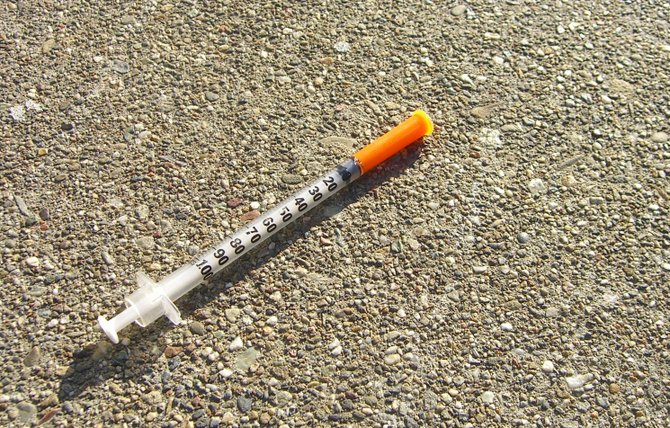Narcotics officials across South Mississippi say heroin is nothing new to the region but they have seen a gradual increase in recent years.
BILOXI, Miss. (AP) — Heroin, a deadly drug that plagues other areas of the nation, is on the rise in South Mississippi.
Heroin has become such a problem in many areas of the nation U.S. Attorney General Eric H. Holder Jr. has declared it "an urgent and growing public health crisis" and has urged emergency personnel to carry an anti-overdose drug.
Narcotics officials across South Mississippi say heroin is nothing new to the region but they have seen a gradual increase in recent years.
"We began seeing more after Hurricane Katrina, with people from New Orleans East moving over here or having connections over there," said Jeremy Skinner, commander of the Hancock County Narcotics Task Force.
"All of a sudden, we are seeing it a lot more."
Heroin has made local headlines in the past week. On Tuesday, a Harrison County woman died before a friend could get her to a hospital in Hancock County. Officials suspect she died of a heroin overdose. On Wednesday, Ocean Springs police seized 13 grams of heroin. On Friday, Hancock County drug agents who arrested two men suspected of distributing heroin said they seized a substantial amount.
Narcotics agents say they expect problems here to increase, following a national trend.
Fatal heroin overdoses nationwide jumped nearly 55 percent from 1999 to 2010, according to the Centers for Disease Control and Prevention. The deaths in that period increased from 1,960 a year to 3,036 a year.
In Ohio, 606 heroin-related deaths were reported in 2012. That was double the state's number in 2010.
Two fatal heroin overdoses have been reported in Mississippi since January. Both were in Corinth. Those and a third overdose in Corinth are believed to be connected.
"Every day, I'm waiting for it to become a bigger problem here," said Daniel Comeaux, agent in charge of the Drug Enforcement Administration's Gulfport office.
Heroin, a depressant or "downer," has effects similar to oxycodone, an opiate or narcotic prescribed to treat moderate to severe pain. Both are highly addictive.
Officials believe heroin is gaining in popularity because prescription drug abusers can buy heroin on the street more cheaply than they can oxycodone.
A "sack" or dose of heroin — about 1/10 of a gram — sells for $5 to $10, compared with $20 to $35 for an illegal purchase of an oxycodone pill, said Harrison County sheriff's Capt. Troy Peterson.
"The heroin you buy on the street is 'cut' with fillers and you don't know what they used or what the purity level is," he said. "The purity level is what kills people. They die because their bodies may be used to having a lower percent (of opiate) and their bodies can't take it."
Just one gram of heroin offers many doses, said Sam Owens, interim director of the Mississippi Bureau of Narcotics. A gram typically sells for $285 to $350. The larger the quantity, the cheaper the unit price.
Owens said one gram is about the same amount of powder in a pack of artificial sweetener.
Most heroin is a white or brown powder. Black tar heroin, often made by Mexican cartels, is the type local narcotics agents said they rarely see except in interstate traffic stops.
Most heroin found in South Mississippi comes from New Orleans, while heroin found north of Jackson tends to come from Memphis, Owens said.
Narcotics agents say it is hard for law enforcement officers to find heroin without probable cause or a search warrant because most of what's sold on the street is small and easy to conceal.
The number of heroin cases in Harrison County in recent years shows the gradual increase.
"We found no heroin in 2010, but it's been here all along, and its presence is gradually increasing," Peterson said.
In 2011, Harrison County narcotics officers handled three heroin cases. There were five in 2012 and seven in 2013.
Statewide, MBN worked 24 heroin cases with 25 arrests in 2012 and about half as many in 2013. But since January, it has worked 23 cases.
"If the trend continues, we will easily eclipse the numbers in 2012 and 2013," Owens said.
One of the troubling aspects is heroin's addictive nature, he said. About 23 percent of people who use it become addicted, according to the National Institute on Drug Abuse. Statistics show more than 200,000 people a year are taken to an emergency room for heroin overdoses.
Anyone with a loved one who uses heroin should persuade them to get into rehabilitation, Owens said.
"It's extremely addicting," he said. "You've got to have a strong willpower and the desire to want to be free of it.
"There's no doubt the onset of prescription drug abuse has brought heroin to the forefront for us."
Copyright Associated Press. All rights reserved. This material may not be published, broadcast, rewritten, or redistributed.



Comments
Use the comment form below to begin a discussion about this content.
comments powered by Disqus